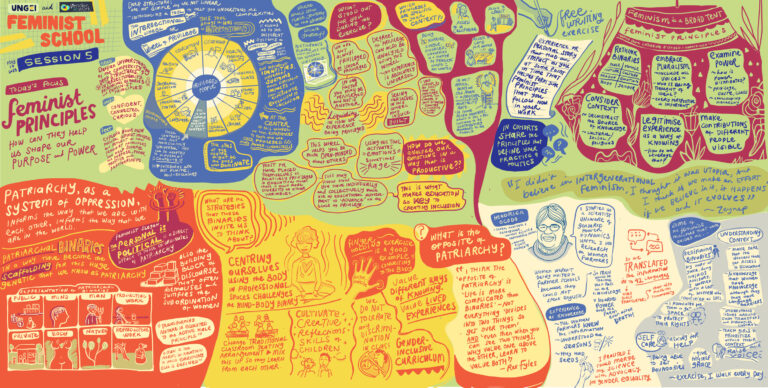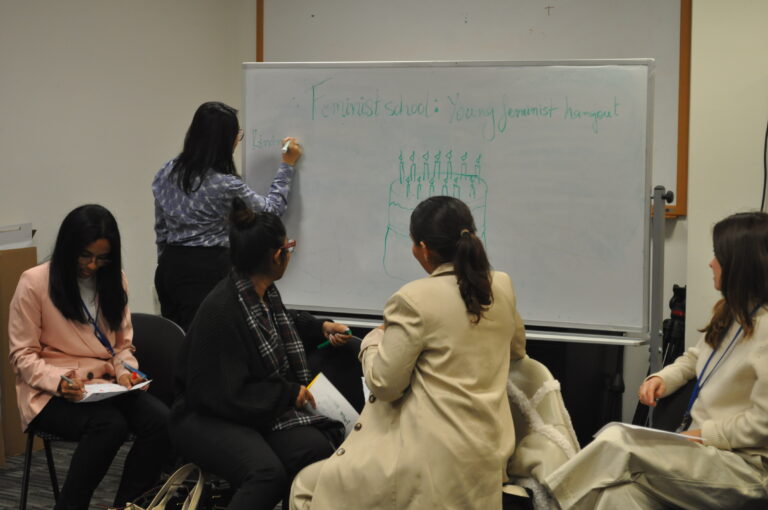Various initiatives and commitments have been made over the years in the global pursuit of gender equality. From CEDAW to SDGs, G7 Summits to Generation Equality Forum, the transformative agenda has resonated across numerous platforms.
Yet, despite these efforts, progress remains slow, particularly in addressing the systemic inequalities faced by girls and women. The education sector, often hailed as a beacon of hope, still grapples with patriarchal norms and discriminatory practices that hinder the full potential of learners of all genders.
The pilot: Feminist School for young activists
In response to these challenges, the Feminist School (FS) project emerged as a re-energising initiative amidst the pandemic, in 2021.
Co-created by the United Nations Girls’ Education Initiative (UNGEI) and Gender at Work, Feminist School was first structured to provide a unique virtual space for young feminist activists from across the world who were interested in deepening their understanding of feminist practices, principles, and approaches via experiential learning to advance gender equality in and through education in their communities.
Recognising the need for collaboration and solidarity across movements, the pilot comprised a diverse cohort of 26 youth activists from the gender justice and education space. They were organising to overcome barriers that prevented the voices of young learners from influencing the policies and practices that most directly affected them.
In a seven-week journey, we re-imagined intergenerational conversations, partnerships, self and collective care, and empowered participants by exploring Gender at Work conceptual and action-based tools that delve into power dynamics, patriarchal binaries, advocacy strategies, and feminist transformative leadership.
“I have learned so much about how important it is to remain grounded as an individual so that when I bring myself to a group or to a movement like feminism, I understand my purpose and I am aware of my politics and even my privileges as well. I will apply that awareness to my work and I will also always remember the “head, heart, hands and feet” concept and I’ve done some of my own personal learning on it to take it back to spaces I organise."
Feminist School ‘take 2’: the Education Civil Society Organisations edition
The inaugural edition of FS garnered positive feedback, leading to the development of a new online edition, this time targeting education Civil Society Organisations (CSOs). Guided by an intergenerational Advisory Group and supported by the Open Society Foundations, this iteration took place between April and May 2023. It aimed to equip 40 education leaders and grassroots organisers from 5 continents with the skills and knowledge needed to challenge patriarchal structures within their respective contexts.

The seven-week online workshops brought together an intergenerational and diverse cohort and fostered discussions on feminist leadership, power and privileges, tools for gender analysis, and self and collective care to support participants’ journeys towards building transformative education systems.
Inspiring speakers also joined us and shared how they use their experiences and understanding of feminism(s) to challenge oppressive systems that are prevalent in the education work they do. For interactive sessions, FS provided a platform for attendees to share experiences and discuss strategies for advancing gender equality in education.
From the online classroom to CSW67
The momentum continued as FS made its debut at the 67th session of the United Nations Commission on the Status of Women (CSW, 2023) in New York City. Supported by the Canadian Mission to the United Nations, Gender at Work and UNGEI organised a well-received side event titled “Patriarchy Disrupted: Embracing innovative feminist learning and digital tools for gender equality!”. The event featured a pocket-size edition of FS, where participants engaged in dynamic discussions on feminist values and leadership.

Moreover, the event explored the intersection of feminist leadership, digital tools, and technology in advancing gender equality. Through dialogue and solidarity, advocates, activists, and policymakers exchanged ideas on building inclusive spaces for learning and activism. The inclusive nature of the event was evident as participants from diverse backgrounds shared their perspectives and experiences and engaged with each other in a fun and invigorating atmosphere.
In addition to the formal sessions, FS at CSW-NY also provided a space for self-care and community building. Recognising the challenges faced by young activists, a session was dedicated to unwinding and discussing the complexities of advocacy in large-scale events like CSW. The inclusive and supportive environment fostered a sense of belonging and empowerment among participants.

… and we are back to school!
With each new iteration, Feminist School reaffirms its commitment to fostering feminist principles and the collective pursuit of gender equality across borders and generations.
Taking its transformative potential forward, we are happy to announce that between April 11 and May 14, 2024, Gender at Work and UNGEI partner once again to roll out a new FS edition. Supported by Echidna Giving and in close collaboration with the Collective Rising Leadership Institute, this new cohort will welcome 31 participants from 6 East Africa-based education CSOs – Literacy and Adult Basic Education (LABE), The Action Foundation, Komo Learning Centres, Msichana Initiative, Basic Needs – Kenya, Grassroots nest for Innovations and Change (GRIC).
With these incredible Education Civil Society organisations, we intend to explore key dimensions of feminist leadership, holistic analysis of gender power dynamics, intersectional understandings of power and privilege, self-care and collective care, feminist principles, tools and practices, especially as they apply to campaigning, policy work and partnerships to advance gender equality and women’s rights in and through education. It seeks to cultivate systems thinking, make visible and challenge patriarchal binaries and foster transformative aspirations.
The long-term goal of Feminist School is to challenge, disrupt and dismantle patriarchy within education systems globally to enable learners of all genders and backgrounds to achieve their fullest potential through inclusive, quality, empowering education – and we are moving one step closer with one edition.



